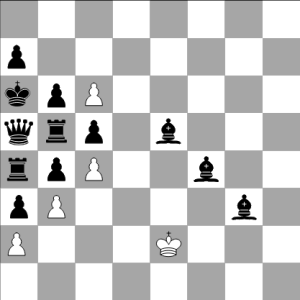 Is the latest version of AlphaZero showing signs of human style intuition and creativity?
Is the latest version of AlphaZero showing signs of human style intuition and creativity?
The current AlphaZero is a more generalised version of the program, produced by Demis Hassabis and his team, that beat top human players of Go for the first time. The new version, presented briefly in Science magazine, is able to learn a range of different games; besides Go it learned chess and shogi, and apparently reached world-class play in all of them.
The Science article, by David Silver et al, modestly says this achievement is an important step towards a fully-general game-playing program, but press reports went further, claiming that in chess particularly AlphaZero showed more human traits than any previous system. It reinvented human strategies and sacrificed pieces for advantage fairly readily, the way human players do; chess commentators said that its play seemed to have new qualities of insight and intuition.
This is somewhat unexpected, because so far as I can tell the latest version is in fact not a radical change from its predecessors; in essence it uses the same clever combination of appropriate algorithms with a deep neural network, simply applying them more generally. It does appear that the approach has proved more widely powerful than we might have expected, but it is no more human in nature than the earlier versions and does not embody any new features copied from real brains. It learns its games from scratch, with only the rules to go on, playing out games against itself repeatedly in order to find what works. This is not much like the way humans learn chess; I think you would probably die of boredom after a few hundred games, and even if you survived, without some instruction and guidance you would probably never learn to be a good player, let alone a superlative one. However, running through possible games in one’s mind may be quite like what a good human player does when trying to devise new strategies.
The key point for me is that although the new program is far more general in application, it still only operates in the well-defined and simple worlds provided by rule-governed games. To be anything like human, it needs to display the ability to deal with the heterogenous and undefinable world of real life. That is still far distant (Hassabis himself has displayed an awareness of the scale of the problem, warning against releasing self-driving cars on to real roads prematurely), though I don’t altogether rule out the possibility that we are now moving perceptibly in the right direction.
Someone who might deny that is Gary Marcus, who in a recent Nautilus piece set out his view that deep learning is simply not enough. It needs, he says, to be supplemented by other tools, and in particular it needs symbol manipulation.
To me this is confusing, because I naturally interpret ‘symbol manipulation’ as being pretty much a synonym for Turing style computation. That’s the bedrock of any conventional computer, so it seems odd to say we need to add it. I suppose Marcus is using the word ‘symbol’ in a different sense. The ones and zeroes shuffled around by a Turing machine are meaningless to the machine. We assign a meaning to the input and so devise the manipulations that the output can be given an interpretation which makes it useful or interesting to us, but the machine itself knows nothing of that. Marcus perhaps means that we need a new generation of machines that can handle symbols according to their meanings.
If that’s it, then few would disagree that that is one of the ultimate aims. Those who espouse deep learning techniques merely think that those methods may in due course lead to a machine that handles meanings in the true sense; at some stage the system will come up with the unknown general strategy that enables it to get meaningful and use symbols the way a human would. Marcus presumably thinks that is hopeless optimism, on the scale of those people who think any system that is sufficiently complex will naturally attain self-awareness.
Since we don’t have much of an idea how the miracle of meaning might happen it is indeed optimistic to think we’re on the road towards it. How can a machine bootstrap itself into true ‘symbol manipulation’ without some kind of help? But we know that the human brain must have done just that at some stage in evolution – and indeed each of our brains seem to have done it again during our development. It has got to be possible. Optimistic yes, hopeless – maybe not.
